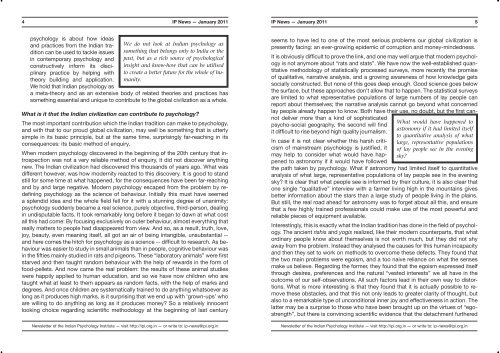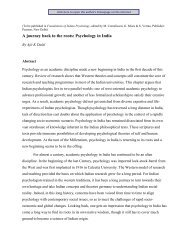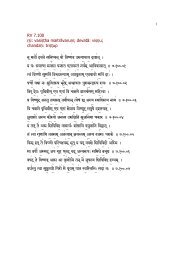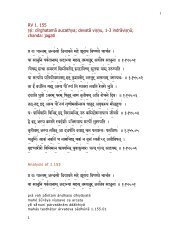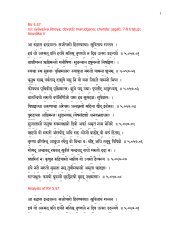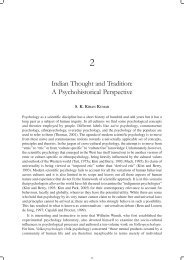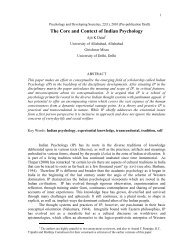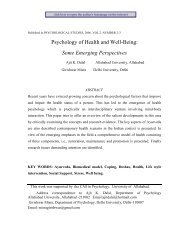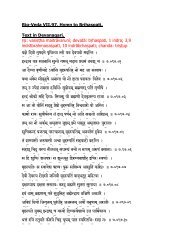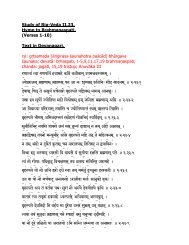ip-news-01-01-web-pr.. - Indian Psychology Institute
ip-news-01-01-web-pr.. - Indian Psychology Institute
ip-news-01-01-web-pr.. - Indian Psychology Institute
- No tags were found...
Create successful ePaper yourself
Turn your PDF publications into a flip-book with our unique Google optimized e-Paper software.
4 IP News — January 2<strong>01</strong>1IP News — January 2<strong>01</strong>1 5psychology is about how ideasand <strong>pr</strong>actices from the <strong>Indian</strong> traditioncan be used to tackle issuesin contemporary psychology andconstructively inform its disc<strong>ip</strong>linary<strong>pr</strong>actice by helping withtheory building and application.We hold that <strong>Indian</strong> psychology asWe do not look at <strong>Indian</strong> psychology assomething that belongs only to India or thepast, but as a rich source of psychologicalinsight and know-how that can be utilisedto create a better future for the whole of humanity.a meta-theory and as an extensive body of related theories and <strong>pr</strong>actices hassomething essential and unique to contribute to the global civilization as a whole.What is it that the <strong>Indian</strong> civilization can contribute to psychology?The most important contribution which the <strong>Indian</strong> tradition can make to psychology,and with that to our <strong>pr</strong>oud global civilization, may well be something that is utterlysimple in its basic <strong>pr</strong>inc<strong>ip</strong>le, but at the same time, sur<strong>pr</strong>isingly far-reaching in itsconsequences: its basic method of enquiry.When modern psychology discovered in the beginning of the 20th century that introspectionwas not a very reliable method of enquiry, it did not discover anythingnew. The <strong>Indian</strong> civilization had discovered this thousands of years ago. What wasdifferent however, was how modernity reacted to this discovery. It is good to standstill for some time at what happened, for the consequences have been far-reachingand by and large negative. Modern psychology escaped from the <strong>pr</strong>oblem by redeningpsychology as the science of behaviour. Initially this must have seemeda splendid idea and the whole eld fell for it with a stunning degree of unanimity:psychology suddenly became a real science, purely objective, third-person, dealingin undisputable facts. It took remarkably long before it began to dawn at what costall this had come: By focusing exclusively on outer behaviour, almost everything thatreally matters to people had disappeared from view. And so, as a result, truth, love,joy, beauty, even meaning itself, all got an air of being intangible, unsubstantial --and here comes the hitch for psychology as a science -- difcult to research. As behaviourwas easier to study in small animals than in people, cognitive behaviour wasin the fties mainly studied in rats and pigeons. These “laboratory animals” were rststarved and then taught random behaviour with the help of rewards in the form offood-pellets. And now came the real <strong>pr</strong>oblem: the results of these animal studieswere happily applied to human education, and so we have now children who aretaught what at least to them appears as random facts, with the help of marks anddegrees. And once children are systematically trained to do anything whatsoever aslong as it <strong>pr</strong>oduces high marks, is it sur<strong>pr</strong>ising that we end up with ‘grown-ups’ whoare willing to do anything as long as it <strong>pr</strong>oduces money? So a relatively innocentlooking choice regarding scientic methodology at the beginning of last centuryNewsletter of the <strong>Indian</strong> <strong>Psychology</strong> <strong>Institute</strong> — visit http://<strong>ip</strong>i.org.in — or write to: <strong>ip</strong>-<strong>news</strong>@<strong>ip</strong>i.org.inseems to have led to one of the most serious <strong>pr</strong>oblems our global civilization is<strong>pr</strong>esently facing: an ever-growing epidemic of corruption and money-mindedness.It is obviously difcult to <strong>pr</strong>ove the link, and one may well argue that modern psychologyis not anymore about “rats and stats”. We have now the well-established quantitativemethodology of statistically <strong>pr</strong>ocessed surveys, more recently the <strong>pr</strong>omiseof qualitative, narrative analysis, and a growing awareness of how knowledge getssocially constructed. But none of this goes deep enough. Good science goes belowthe surface, but these ap<strong>pr</strong>oaches don’t allow that to happen. The statistical surveysare limited to what re<strong>pr</strong>esentative populations of large numbers of lay people canreport about themselves; the narrative analysis cannot go beyond what concernedlay people already happen to know. Both have their use, no doubt, but the rst cannotdeliver more than a kind of sophisticatedpsycho-social geography, the second will ndit difcult to rise beyond high quality journalism.In case it is not clear whether this harsh criticismof mainstream psychology is justied, itmay help to consider what would have happenedto astronomy if it would have followedWhat would have happened toastronomy if it had limited itselfto quantitative analysis of whatlarge, re<strong>pr</strong>esentative populationsof lay people see in the eveningsky?the path taken by psychology. What if astronomy had limited itself to quantitativeanalysis of what large, re<strong>pr</strong>esentative populations of lay people see in the eveningsky? It is clear that what people see is informed by their culture, it is also clear thatone single “qualitative” interview with a farmer living high in the mountains givesbetter information about the stars than a large study of people living in the plains.But still, the real road ahead for astronomy was to forget about all this, and ensurethat a few highly trained <strong>pr</strong>ofessionals could make use of the most powerful andreliable pieces of equ<strong>ip</strong>ment available.Interestingly, this is exactly what the <strong>Indian</strong> tradition has done in the eld of psychology.The ancient rishis and yogis realized, like their modern counterparts, that whatordinary people know about themselves is not worth much, but they did not shyaway from the <strong>pr</strong>oblem. Instead they analysed the causes for this human incapacityand then they set to work on methods to overcome these defects. They found thatthe two main <strong>pr</strong>oblems were egoism, and a too naive reliance on what the sensesmake us believe. Regarding the former, they found that the egoism ex<strong>pr</strong>essed itselfthrough desires, <strong>pr</strong>eferences and the natural “vested interests” we all have in theoutcome of our self-observations. All such factors lead in their own way to distortions.What is more interesting is that they found that it is actually possible to removethese obstacles, and that this not only leads to greater clarity of thought, butalso to a remarkable type of unconditional inner joy and effectiveness in action. Thelatter may be a sur<strong>pr</strong>ise to those who have been brought up on the virtues of “egostrength”,but there is convincing scientic evidence that the detachment furtheredNewsletter of the <strong>Indian</strong> <strong>Psychology</strong> <strong>Institute</strong> — visit http://<strong>ip</strong>i.org.in — or write to: <strong>ip</strong>-<strong>news</strong>@<strong>ip</strong>i.org.in


